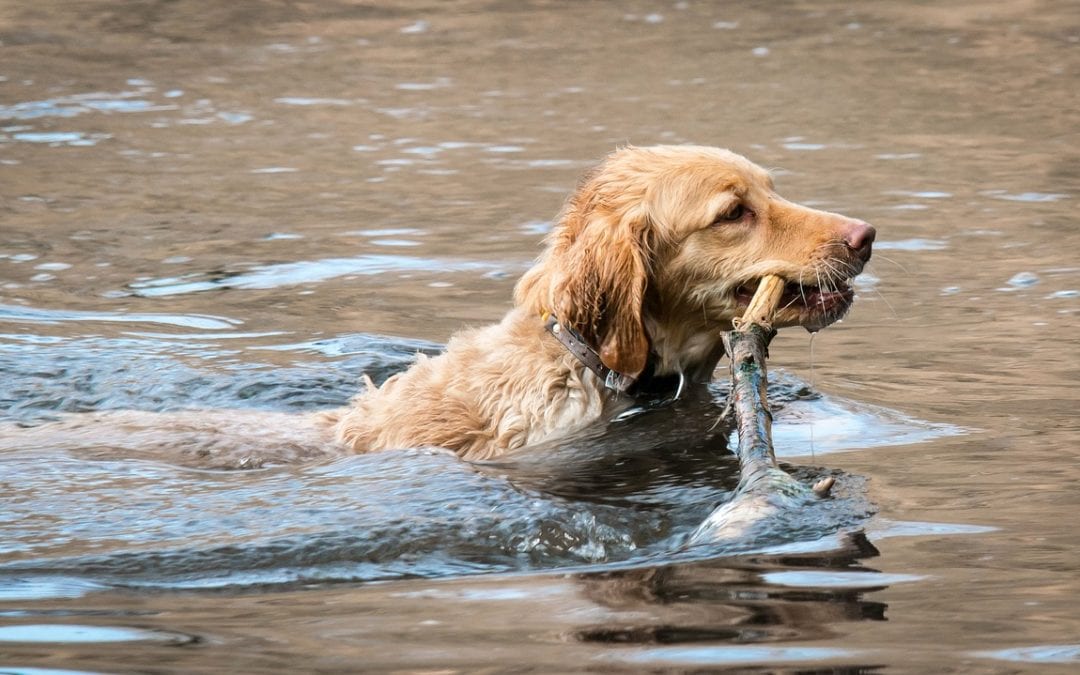Most of us love to spend long weekends and summer days on the many lakes and rivers of Michigan and the Midwest, especially as the temperature starts to climb! One of the abounding benefits to summer lake trips is that we can spend quality time with our family and friends, including our best four-legged friends.
But, as the temperature swells and you make a beeline for the waterfront, you’ll want to keep your pet’s safety in mind. Although you may think about pet safety issues such as overheating and mosquito bites, there are many more considerations to account for when it comes to safe swimming and boating with your pet.
General Water Safety
Contrary to popular belief, not all dogs are natural swimmers, or even enjoy swimming. A water-frightened or timid dog should never be forced to swim. For dogs that do like to swim, but aren’t very good at it, it may even be a good idea to enroll your friend in swimming lessons before heading to deep waters.
Just like us, your pet can get tired in the water and therefore are also at risk for drowning. Protect your pup by purchasing a life jacket, such as the Kyjen Outward Hound Life Jacket, to be worn in the water or on a boat.
Other considerations for keeping your pet safe while near water include close supervision while in and around water, knowing safe entry and exit points into and out of the water for your pet, and avoiding areas with boats, jet skis, and other recreation vehicles. Also, watch for currents that could easily pull your dog out of safety range. Keep your pets close!
Pests and Parasites
Even pets can’t escape the occasional mosquito or fly bite, especially when recreating near a body of water. Warmer weather guarantees there will be a variety of pests, including fleas, ticks, black flies, and heartworm-infected mosquitos.
The best way to keep your pet free of insect-borne diseases and infections is to use a monthly parasite preventative. If you are unsure what your pet needs, call us and we can schedule an appointment to tailor your pet’s vaccination and parasite preventative routine to his or her specific needs.
Doggy Drinks
Freshwater lakes are often host to bacteria and parasites that can cause life-threatening illnesses in your pet. Exposure to outdoor water sources can change their vaccination requirements, so it is important to communicate travel, disease exposure, health and age, and other factors that may impact your pet’s vaccination regimen during your dog’s wellness examination.
You may be familiar with water-related infections that humans are also susceptible to, such as Giardia. But, a particularly virulent bacterial disease, Leptospirosis, is becoming more common in pets due to the growing populations of wildlife, like raccoons and skunks, which carry the disease and infect pets indirectly through soil and water. Leptospirosis is a zoonotic disease, meaning it can be transferred from animals to humans, creating an even greater health risk for the entire family.
Fortunately, these diseases can be prevented through vaccinations.
Clean, Dry Ears are Healthy Ears
For pets exposed to water, it’s a good idea to watch for any potential problems, such as an ear infection. Signs of an ear infection include ear scratching, discharge, redness, and swelling. Be sure to physically dry the inside of your dog’s ears as soon as he or she gets out of the water. The longer the water lingers in your dog’s ears, the greater the risk of fungal, yeast, or bacterial growth.
When in doubt about future outdoor activity and pet swimming, call us for additional information on keeping your pet safe while having fun on the water. And, don’t forget to keep your pet’s microchip and identification tag information up-to-date.

